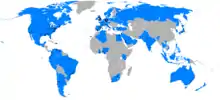Twitter trends
On Twitter, a word, phrase, or topic that is mentioned at a greater rate than others is said to be a "trending topic" or simply a "trend".[1] Trending topics become popular either through a concerted effort by users or because of an event that prompts people to talk about a specific topic.[2] These topics help Twitter and their users to understand what is happening in the world and what people's opinions are about it.[3]

Trending topics are sometimes the result of concerted efforts and manipulations by fans of certain celebrities or cultural phenomena. Twitter has altered the trend algorithm in the past to prevent manipulation of this type with limited success.[4]
Content
A recent study[1] analysed trending topics of 2018 according to several criteria. Their results highlight a number of points:
- More than 68% of trends were hashtags.[1]
- Around 45% of trends consist of more than one word. In average, they contain 13 characters.[1]
- 28% (977 topics in 2018) of all first rank trending topics reached that position in less than 10 minutes.[1]
- In average, a topic needs more than 112 thousand tweets to reach the top ten list, and 263 thousand tweets to reach the first rank.[1]
- English language comprised 39% of all topics. Arabic with 20% and Spanish with 7% were the second and third most popular languages for trending topics.[1]
Impact
Examples of high-impact topics include the wildfires in San Diego,[5] the earthquake in Japan,[6] popular sporting events,[7] and political uprisings in Iran[8] and Egypt.[9]
Controversies
Twitter often censors trending hashtags that are claimed to be abusive or offensive. Twitter censored the #Thatsafrican[10] and #thingsdarkiessay hashtags after users complained that they found the hashtags offensive.[11] There are allegations that Twitter removed #NaMOinHyd from the trending list and added an Indian National Congress-sponsored hashtag.[12]
References
- Annamoradnejad, Issa; Habibi, Jafar (2019). "A Comprehensive Analysis of Twitter Trending Topics". 2019 5th International Conference on Web Research (ICWR). Tehran, Iran: IEEE: 22–27. arXiv:1907.09007. Bibcode:2019arXiv190709007A. doi:10.1109/ICWR.2019.8765252. ISBN 9781728114316.
- "Bloggers back media against youth league". Archived from the original on July 18, 2011. Retrieved April 3, 2010.
- "Top Twitter Trends of 2009". Retrieved April 3, 2010.
- Vicky Woollaston. "Justin Bieber fans beat Twitter 'block' | Web User magazine". Webuser.co.uk. Archived from the original on November 22, 2012. Retrieved January 20, 2012.
- Wang, Zheye; Ye, Xinyue; Tsou, Ming-Hsiang (2016-08-01). "Spatial, temporal, and content analysis of Twitter for wildfire hazards". Natural Hazards. 83 (1): 523–540. doi:10.1007/s11069-016-2329-6. ISSN 1573-0840.
- Sakaki, Takeshi; Okazaki, Makoto; Matsuo, Yutaka (2010). "Earthquake Shakes Twitter Users: Real-time Event Detection by Social Sensors". Proceedings of the 19th International Conference on World Wide Web. WWW '10. New York, NY, USA: ACM: 851–860. doi:10.1145/1772690.1772777. ISBN 9781605587998.
- Nichols, Jeffrey; Mahmud, Jalal; Drews, Clemens (2012). "Summarizing Sporting Events Using Twitter". Proceedings of the 2012 ACM International Conference on Intelligent User Interfaces. IUI '12. New York, NY, USA: ACM: 189–198. doi:10.1145/2166966.2166999. ISBN 9781450310482.
- Burns, Alex; Eltham, Ben (2009-11-24). "Twitter Free Iran: an Evaluation of Twitter's Role in Public Diplomacy and Information Operations in Iran's 2009 Election Crisis" (PDF). University of Technology, Sydney: 322–334. Cite journal requires
|journal=(help) - Choudhary, Alok; Hendrix, William; Lee, Kathy; Palsetia, Diana; Liao, Wei-Keng (2012-05-01). "Social media evolution of the Egyptian revolution". Communications of the ACM. 55 (5): 74. doi:10.1145/2160718.2160736.
- Weiner, David (June 21, 2009). "#Thatsafrican – When Twitter Went Racist?". Huffington Post. Retrieved April 3, 2010.
- "Thingsdarkiessay causes a Twitter storm". Independent Online. South Africa. November 5, 2009. Retrieved January 11, 2012.
- Gupta, Kanchan (August 13, 2013). "Role of Twitter in trending wars". NITI Central. Archived from the original on August 16, 2013. Retrieved August 14, 2013.